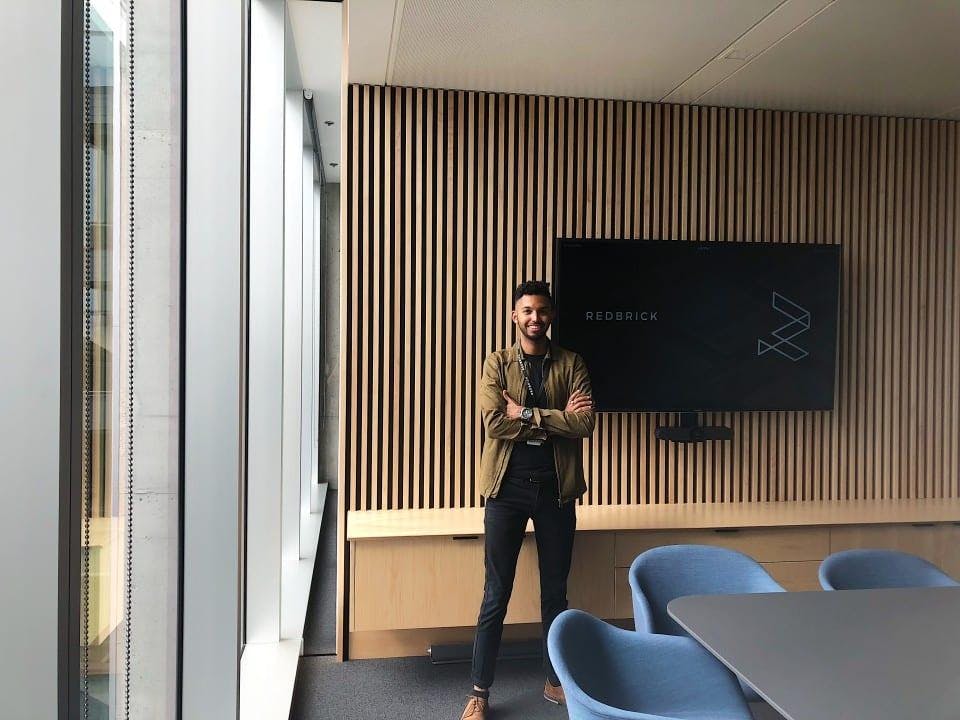"Fast-paced, challenging, but extremely rewarding."
After spending 12 weeks and over 536 hours working at one of the fastest-growing tech companies in Canada, I’m left with only one feeling: accomplishment.
As I complete my second professional internship (co-op) as a commerce student, I am taking some time to reflect on all the learning and growth I’ve experienced over the last few months. Working for Redbrick has been one of the most challenging experiences I’ve had throughout my undergrad journey.
The learning curve
With a background in the corporate defense industry from my last internship, joining the tech sector was a challenge I decided to take on mainly to learn something new and to have a different perspective on how this type of business works. There is no set of guidelines or techniques that will prepare someone to work in a thriving tech environment.
You can take IS management courses, do extensive research on the industry, and even read books and blogs about the topic; nonetheless, it’s a unique experience. There is a mystifying aspect to the tech industry that is both enticing and intriguing.
I was hired as a Business & Marketing intern for Assembly, a Redbrick company, supporting the media buying team on a variety of digital publishing properties and verticals. With a monthly traffic of 25M+ across all our sites, the thought of joining such a performance-driven team was daunting, to say the least.
I remember walking out of meetings with a million new terms and jargon I had to Google in order to do simple daily tasks. It felt like learning a new language, a new culture, and a new job, all at once.
During my first few weeks as an intern, I spent countless hours trying to understand not only how digital publishing and AdTech works, but also how my specific job contributed to the success of my team and the organization.
Feeling lost in the midst of digital advertising became the norm, and questioning the complex relationship between advertisers, publishers and visitors became a habit. I quickly found myself diving solo in the deep end.
"It felt like learning a new language, a new culture, and a new job, all at once"
Media buying is particularly valuable in how applicable it is to any business growth initiative. Launching, optimizing, and scaling a campaign can determine whether you reach the right audience or get buried in the millions of players on the web.
Analyzing an audience’s performance at a granular level, such as a number of impressions, preferred device, geographical location, click-through rate, and even conversion cost can literally make or break a business.
The so-called “Impostor Syndrome”
In hindsight, the uncertainty of not having the answers to all of my questions paved the road to a journey of growth and self-discovery. I often questioned my knowledge, skills, and abilities, and if I was going to be able to survive an entire summer at the job. Did I get this job out of luck? Do they know I don’t know how to use these tools? I certainly didn’t lie about my skills during my application and interview, but a part of me felt like I had so much to learn and so much to understand.
The more I connected with people in the company and learned about their journeys in the industry, the more I realized how common it was to experience that steep of a learning curve. Tech is an environment that is always evolving, changing, and disrupting.
Working in tech means not having an answer to everything, but instead having an unsatisfiable curiosity and drive to do things differently.
A few days before writing this article, we moved into a new office space in one of the most prestigious buildings in the city, and with the move came a companywide rebrand and new strategic direction. I clearly remember our CEO’s welcome speech; he mentioned having feelings of impostor syndrome.
This stuck with me, mainly because it resonated with how I felt at the beginning of my term with Redbrick. During the first few weeks of my internship, my confidence was shaken and I struggled to believe in myself. It felt like everyone around me was ready to run, while I was still learning how to walk.
Independence & trust: the key to empowerment
One of the biggest outcomes I’ve had from this internship has been the level of trust and independence I was given to plan, execute, and troubleshoot a project. A little over four weeks into my internship, I had the opportunity to present a new initiative to my manager and our CMO.
I clearly remember sitting at the table, talking about the project and taking full ownership over how to launch and drive the idea. That’s when all the pieces connected. I felt confident and ready to tackle any challenge, mainly because of how much trust and independence I was given from the moment I walked in the door.
Yes, I felt lost, but I was also welcomed into a supportive environment that challenged me and gave me the tools to succeed. The beautiful thing about tech is that it’s a powerful, growing industry that still feels nimble and entrepreneurial. It constantly challenges you to rethink “business as usual” to find a new, better, more effective way to meet your objectives.
Reflecting on the last few months, I have come to the realization that the tech sector is truly an industry that is shaping, and will continue to shape, the way business is done across other industries. Becoming tech-literate is a must, regardless of one’s career or profession.
Whether you are looking to better connect with your customers, grow your business, or make powerful data-driven decisions, being tech-literate means being strategic.
What’s next?
I have no doubt that more industries will gravitate toward a more tech-driven approach, and as individuals, there is a lot of potential for personal growth and professional development in the technology sector. I believe that anyone seeking to remain competitive in the market must continue to adapt and expose themselves to new experiences.
If we really want to make a difference and develop a new way of thinking, we need to understand and embrace technology to empower us and enable us to understand the complexity of doing business in the 21st century.
And, as for me? I’m excited to continue on my journey of knowledge as I head out on a four-month exchange to Singapore, the city-state that “has emerged as a world-class technology hub in Asia.” The next few months will be an exciting opportunity to combine everything I’ve learned this summer with some of the most innovative industry best-practices.




